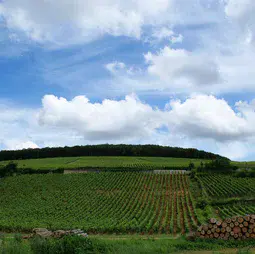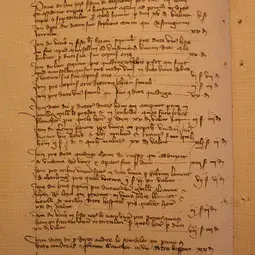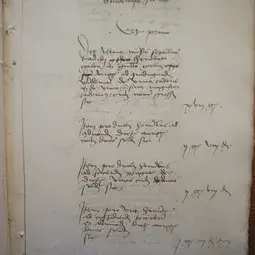Burgundy wine grapes tell climate story, show warming accelerated in past 30 years
29 August 2019
A newly published series of dates of grape harvest covering the past 664 years is the latest line of evidence confirming how unusual the climate of the past 30 years has been. The record shows wine grapes in Burgundy, eastern France, have been picked 13 days earlier on average since 1988 than they were in the previous six centuries, pointing to the region’s hotter and drier climate in recent years. The results are now published in the European Geosciences Union (EGU) journal Climate of the Past.
“We did not anticipate that the accelerated warming trend since the mid-1980s would stand out so clearly in the series,” says Christian Pfister, a professor at the Oeschger Centre for Climate Change Research at the University of Bern, Switzerland. He conducted the study with other scientists and historians in Switzerland, France and Germany.
Thomas Labbé, a researcher at the universities of Burgundy and Leipzig and lead-author of the study, meticulously reconstructed dates of grape harvest in Beaune – the wine capital of Burgundy – going back to 1354. He used a large number of unedited archival sources, including information on wage payments made to grape pickers, Beaune city council records and newspaper reports. The continuous record of grape harvest dates now published in Climate of the Past extends until 2018 and is the longest ever reconstructed.
“The record is clearly divided in two parts,” says Labbé. Until 1987, wine grapes were typically picked from 28 September onward, while harvests have begun 13 days earlier on average since 1988. The team’s analysis of the series shows very hot and dry years were uncommon in the past, but have become the norm in the last 30 years.
Grape harvest dates can be used as a proxy to study the climate because wine grapes are very sensitive to temperature and rainfall. As an article in the French tourism website france.fr puts it, “Mother Nature is really the one who decides” when grapes are ripe enough to be picked. In years when the spring-summer (the growing season) is hot and dry, the grapes are ready for harvest earlier than in colder years.
The team validated their grape harvest series using detailed temperature records of Paris covering the past 360 years. This allowed them to estimate the April-to-July temperatures in the Beaune region for the entire 664 years covered by their record of grape harvest dates.
“The transition to a rapid global warming period after 1988 stands out very clearly. The exceptional character of the last 30 years becomes apparent to everybody,” says Pfister.
“We hope people start to realistically consider the climate situation in which the planet is at present,” he concludes.
###
Please mention the name of the publication (Climate of the Past) if reporting on this story and, if reporting online, include a link to the paper (https://www.clim-past.net/15/1485/2019/) or to the journal website (https://www.climate-of-the-past.net/).
A French version of this press release is available on request. Please email Bárbara Ferreira at media@egu.eu.
More information
This research is presented in the paper “The longest homogeneous series of Grape Harvest Dates, Beaune 1354–2018, and its significance for the understanding of past and present climate” published in the EGU open access journal Climate of the Past on 29 August 2019.
The study was conducted by Thomas Labbé (Leibniz Institute for the History and Culture of Eastern Europe, University of Leipzig, Germany and Maison des Sciences de l’Homme de Dijon, University of Burgundy, Dijon, France), Christian Pfister (Oeschger Centre for Climate Change Research, University of Bern, Switzerland), Stefan Brönnimann (Oeschger Centre for Climate Change Research & Institute of Geography, University of Bern, Switzerland), Daniel Rousseau (Conseil Supérieur de la Météorologie, Paris, France), Jörg Franke (Oeschger Centre for Climate Change Research & Institute of Geography, University of Bern, Switzerland), and Benjamin Bois (Biogéosciences & Institut Universitaire de la Vigne et du Vin, University of Burgundy, Dijon, France).
Citation: Labbé, T., Pfister, C., Brönnimann, S., Rousseau, D., Franke, J., and Bois, B.: The longest homogeneous series of grape harvest dates, Beaune 1354–2018, and its significance for the understanding of past and present climate, Clim. Past, 15, 1485–1501, doi:10.5194/cp-15-1485-2019, 2019.
The European Geosciences Union (EGU) is the leading organisation for Earth, planetary and space science research in Europe. With our partner organisations worldwide, we foster fundamental geoscience research, alongside applied research that addresses key societal and environmental challenges. Our vision is to realise a sustainable and just future for humanity and for the planet. We publish a number of diverse scientific journals, which use an innovative open access format, and organise topical meetings, and education and outreach activities. The annual EGU General Assembly is the largest and most prominent European geosciences event, attracting over 16,000 scientists from all over the world in 2019. The meeting’s sessions cover a wide range of topics, including volcanology, planetary exploration, the Earth’s internal structure and atmosphere, climate, as well as energy and resources. The EGU General Assembly 2020 is taking in Vienna, Austria, from 3 to 8 May 2019. For information and press registration, please check https://www.egu.eu/gamedia closer to the time of the event, or follow the EGU on Twitter and Facebook.
If you wish to receive our press releases via email, please use the Press Release Subscription Form at https://www.egu.eu/news/subscribe/. Subscribed journalists and other members of the media receive EGU press releases under embargo (if applicable) 24 hours in advance of public dissemination.
Climate of the Past (CP) is an international scientific journal dedicated to the publication and discussion of research articles, short communications, and review papers on the climate history of the Earth. CP covers all temporal scales of climate change and variability, from geological time through to multidecadal studies of the last century. Studies focusing mainly on present and future climate are not within scope.
Contact
Researchers
Christian Pfister
Professor Emeritus for Economic, Social and Environmental History
Oeschger Centre for Climate Change Research, University of Bern
Phone +41-31-631-31-45
Email christian.pfister@hist.unibe.ch
Languages German, English, French
Thomas Labbé
Researcher, University of Leipzig and University of Burgundy
Phone +33-645-17-24-98
Email thomas.labbe@u-bourgogne.fr
Languages French, English
Press officer
Bárbara Ferreira
EGU Media and Communications Manager
Munich, Germany
Phone +49-89-2050-76340
Email media@egu.eu
EGU on Twitter: @EuroGeosciences



